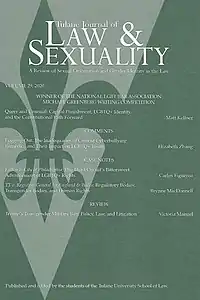Tulane Journal of Law & Sexuality
The Tulane Journal of Law & Sexuality is a student-edited law review published by Tulane University Law School, and is the official law journal for the National LGBT Bar Association.[1] It was the first law journal to solely discuss legal issues concerning the LGBTQ+ community in the United States, and continues to publish the winning article of the annual Michael Greenberg Writing Competition.[1] The journal has published works involving constitutional, employment, family, healthcare, insurance and military law among other topics intersecting with sexuality.
 Volume 29 cover (2020) | |
| Discipline | Sex and the law |
|---|---|
| Language | English |
| Edited by | Editha Rosario |
| Publication details | |
Former name(s) | Law & Sexuality |
| History | 1991–present |
| Publisher | Tulane University Law School (United States) |
| Frequency | Annual |
| Standard abbreviations | |
| Bluebook | Tul. J. L. & Sex. |
| ISO 4 | Tulane J. Law Sex. |
| Indexing | |
| ISSN | 1062-0680 |
| LCCN | 93649001 |
| OCLC no. | 47173063 |
| Links | |
History and membership
The journal was established in 1991 as Law & Sexuality: A Review of Lesbian and Gay Legal Issues, becoming the first legal publication dedicated solely to analysis of LGBTQ+ issues.[2] In 1997, its title was amended to Law & Sexuality: A Review of Lesbian, Gay, Bisexual and Transgender Legal Issues. In 2012, the journal obtained its current title, Tulane Journal of Law & Sexuality: A Review of Sexual Orientation and Gender Identity in the Law.
Members are chosen through writing competitions conducted annually in the summer and fall. Members agree to either a one or two-year commitment based on their graduation date.
Notable articles
The following articles have been cited most often:
- Nan D. Hunter, Marriage, Law, and Gender: A Feminist Inquiry, 1 Tul. J. L. & Sex. 9 (1991).
- Gary David Comstock, Dismantling the Homosexual Panic Defense, 2 Tul. J. L. & Sex. 81 (1992).
- Darren Rosenblum, Queer Intersectionality and the Failure of Recent Lesbian and Gay "Victories", 4 Tul. J. L. & Sex. 83 (1994).
- Laurie Rose Kepros, Queer Theory: Weed or Seed in the Garden of Legal Theory, 9 Tul. J. L. & Sex. 279 (2000).
- Jillian Todd Weiss, The Gender Caste System: Identity, Privacy, and Heteronormativity, 10 Tul. J. L. & Sex. 123 (2001).
- Cece Cox, To Have and to Hold - Or Not: The Influence of the Christian Right on Gay Marriage Laws in the Netherlands, Canada, and the United States, 14 Tul. J. L. & Sex. 1 (2005).
- Rebecca Mann, The Treatment of Transgender Prisoners, Not Just an American Problem - A Comparative Analysis of American, Australian, and Canadian Prison Policies Concerning the Treatment of Transgender Prisoners and a Universal Recommendation to Improve Treatment, 15 Tul. J. L. & Sex. 91 (2006).
- Ummni Khan, A Woman's Right to Be Spanked: Testing the Limits of Tolerance of SM in the Socio-Legal Imaginary, 18 Tul. J. L. & Sex. 79 (2009).
- Annette Houlihan, When "No" Means "Yes" and "Yes" Means Harm: HIV Risk, Consent and Sadomasochism Case Law, 20 Tul. J. L. & Sex. 31 (2011).
- Maura McNamara, Better to Be Out in Prison Than out in Public: LGBTQ Prisoners Receive More Constitutional Protection if They Are Open About Their Sexuality While in Prison, 23 Law & Sexuality: Rev. Lesbian, Gay, Bisexual and Transgender Legal Issues 135 (2014).
- Alexandra Brandes, The Negative Effect of Stigma, Discrimination, and the health Care System on the Health of Gender and Sexual Minorities, 23 Tul. J. L. & Sex. 155 (2014).
- Aeyal Gross, Rape by Deception and the Policing of Gender and Nationality Borders, 24 Tul. J. L. & Sex. 1 (2015).
- Deborah Lolai, You're Going to Be Straight or You're Not Going to Live Here: Child Support for LGBT Homeless Youth, 24 Tul. J. L. & Sex. 35 (2015).
- Michael J. Griffin, Intersecting Intersectionalities and the Failure of the Law to Protect Transgender Women of Color in the United States, 25 Tul. J. L. & Sex. 123 (2016).
- Alexandra Masri, Equal Rights, Unequal Protection: Institutional Failures in Protecting and Advocating for Victims of Same-Sex Domestic Violence in Post-Marriage Equality Era, 27 Tul. J. L. & Sex. 75 (2018).
- James Hampton, Homosexuality: An Aggravating Factor, 28 Tul. J. L. & Sex. 25 (2019).
The Michael Greenberg Writing Competition
Michael Greenberg was a former member of the National LGBT Bar Association and a Philadelphia attorney who died in 1996 from AIDS complications.[3] The competition was created in his memory, and recognizes exceptional student legal scholarship concerning the LGBTQ+ community.[3] The Tulane Journal of Law & Sexuality selects a winner and runner-up eligible for cash prizes and free registration to the annual Lavender Law Conference and Career Fair.[3] Each winner and submission are reviewed for potential publication in the journal.
Recent winners:
- Cassidy Duckett (2020), Temple University Beasley School of Law, "Downtowns and Diverted Dollars: How the Metronormativity Narrative Damages Rural Queer Political Organizing."
- Matt Kellner (2019), Yale Law School, "Queer and Unusual: Capital Punishment, LGBTQ Identity, and the Constitutional Path Forward."
- Emily Lamm (2018), Vanderbilt Law School, "Bye, Bye, Binary: Updating Birth Certificates to Transcend the Binary of Sex."
- Sarah Capasso-Kosan (2017), Brooklyn Law School, "A Proposal for the First National Equality Tax Credit Act."
- Elizabeth B. Booker (2016), University of Memphis School of Law, "The ADA's Exclusion of Gender Dysphoria: An Analysis of the Rift Between Jurisprudence and Mental Health."
See also
References
- "Law & Sexuality Journal". Homepage. Tulane Law School. Retrieved 2011-06-25.
- "About the Journal | Tulane Law School".
- "Michael Greenberg Writing Competition".
